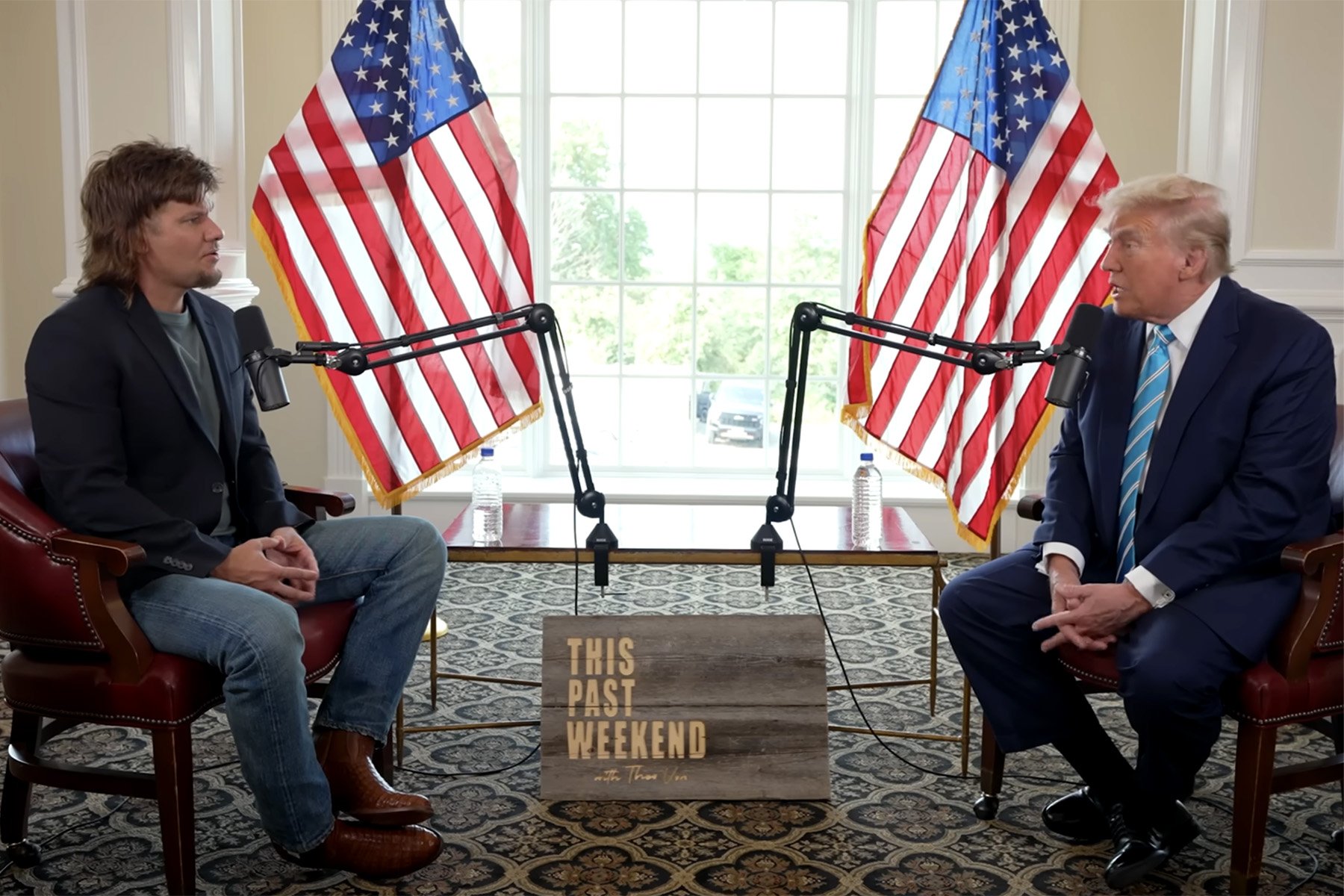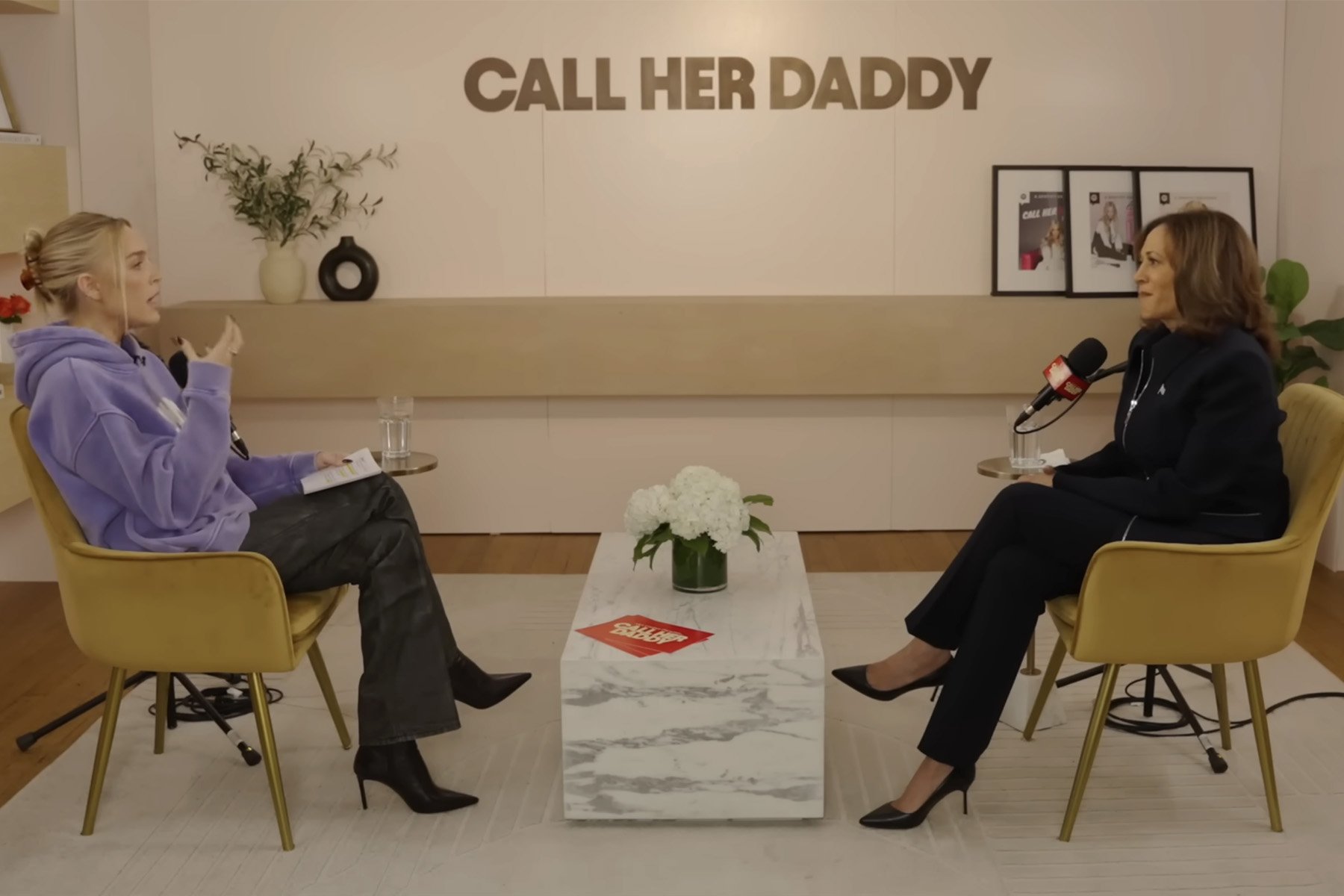Your trusted source for contextualizing abortion and Election 2024 news. Sign up for our daily newsletter.
Alex Cooper’s “Call Her Daddy” podcast gets downloaded more than 5 million times each week, making it the second most popular podcast in the world. It’s also the top podcast among 18- to 24-year-old women in the United States, which is a particularly important constituency for Vice President Kamala Harris, the Democratic Party nominee. She sat down with Cooper for Sunday’s episode, talking about her background, beliefs, and campaign as she appealed directly to the “Daddy Gang” over a 40-minute interview.
Three million people — many of them young men — subscribe to Theo Von’s YouTube channel. Von rose to fame with a Comedy Central special in which he chided audience members for laughing at the “wrong” part of a protracted joke about racist assumptions. In late August, he conducted a nearly hour-long interview with Harris’ rival, former President Donald Trump, who told Von that his 18-year old-son, Barron, is a fan.
There has long been a gender gap among American voters, with women more likely than men to vote for Democrats. This cycle, it’s especially pronounced in Gen Z — and the campaigns are paying attention. Trump and Harris are engaged in strategic media outreach to Gen Z men and women, respectively, by meeting them in the virtual spaces they inhabit. What remains to be seen is how the campaigns will translate the online outreach to these core demographics into votes on Election Day.
Melissa Deckman, the CEO of PRRI, a nonprofit, nonpartisan political research group, and the author of “The Politics of Gen Z,” said Harris’ appearance on “Call Her Daddy” was a “notable departure” for a presidential candidate — but an important one, given that Gen Z is “chronically online” and not prone to getting their news and information from television, newspaper or legacy media sources.
“The campaigns have really had to pivot to that reality, and so I think it’s smart for Harris to appear on a show like “Call Her Daddy,” because the listenership is more young and it’s largely young women,” Deckman said.

Young men, for their part, often gravitate toward platforms that brand themselves as a rejection of mainstream media frames. Many of these outlets are ones that overtly challenge the idea that feminism has offered a net benefit to society. Often referred to collectively as the “manosphere,” these outlets attract huge numbers of young — and frequently White — men who connect over feeling disaffected with the status quo and left out of “woke” society.
Deckman describes Trump’s appearances with vlogger-turned-wrestler Logan Paul and streamer Adin Ross, two influential figures on the right, as a concerted effort to appear with media personalities who may not be known for hard-hitting political coverage but whose listeners are overwhelmingly young men “who seem to be sick of politics and also not thinking about politics.”
Polling released last month from The 19th and SurveyMonkey found that 57 percent of Gen Z women have a favorable view of Harris, compared with 44 percent of Gen Z men.
“You won’t see Trump appearing on blogs or podcasts that are appealing to young women. They’ve made a very calculated decision,” Deckman said. “I think it’s notable because young men seem to be more up for grabs this election cycle.”
But Deckman stressed that though the places young men may turn to for content frequently take far-right positions, these views aren’t necessarily the ones held by their audience.
“The reality is that when you look at the policy positions of young men, they’re largely left of center when it comes to things like abortion attitudes, LGBTQ rights, having a larger role for the government to play in terms of student loan debt, and racial equality,” she added.
The Harris campaign isn’t only trying to reach young women, though its outreach to young men has played out in less direct ways, often through messaging around Harris’ running mate, Gov. Tim Walz, a hunter, father, and former high school football coach. At the Democratic National Convention, Walz was introduced by his former high school football players; he has made regular campaign stops at games and tailgates since the start of college football season.
This week, however, it tried a different approach by streaming an Arizona rally with Walz from the campaign’s Twitch account, which they started in August after the DNC; creator Preheat, a campaign volunteer, provided commentary on the rally while streaming his play of World of Warcraft after first explaining how to defeat a new raid boss in the game.
The 19th News/SurveyMonkey poll found that 28 percent of Gen Z women think that Trump cares about the problems of people like them, compared with 40 percent of Gen Z men. When it comes to Harris, these numbers are almost exactly flipped, with 38 percent of Gen Z women saying that Harris cares about the problems of people like them, compared with 29 percent of Gen Z men.
Taylor Salditch, the executive director of Supermajority, an organization that focuses on turning out young women voters around progressive issues, said that while Gen Z women lean toward Harris, they aren’t necessarily base Democratic voters. “They must be engaged and talked to and the question is what messages are best for doing so,” Salditch said. She said “Call Her Daddy” can reach young women who aren’t engaged in politics — the same young women who Supermajority Education Fund research has found to be feeling overwhelmed by economic issues like cost of living, grocery prices, and student loan debt.
“These folks need to have value-based conversations about the information and getting information delivered in a non-judgmental, almost apolitical way for them to get to a place where they have a plan to go and vote for her,” she said. “It’s a process. It’s not a transactional text message.”
Salditch said that this cycle, she’s seen first-hand how these voters are not automatically already Harris voters, but can be made to be with conversations about their needs and how Harris stands to address them. The core parts of Harris’ campaign — especially her messages around the economy, gun violence, and reproductive health care — are in line with many of these young women’s values.
“Gen Z and Millennial women are the largest cohort of the women’s voting bloc, outpacing Gen X and Boomers. This will be the largest voting bloc for many elections to come,” she said. “Young women, especially infrequent and nonvoting young women, are not the base of the Democratic Party and they need to be courted and paid attention to and they need to know that their government can work for them. According to our research, they don’t believe that government works today, but they do have cautious optimism that it can work in the future. 2025 is that opportunity.”
In appealing directly to them, Harris is also speaking to another key dynamic of this election, Salditch said. “I do not believe that young women are making a decision between Trump and Harris,” she continued. “They’re making a decision between Harris and home.”
To check your voter registration status or to get more information about registering to vote, text 19thnews to 26797.





